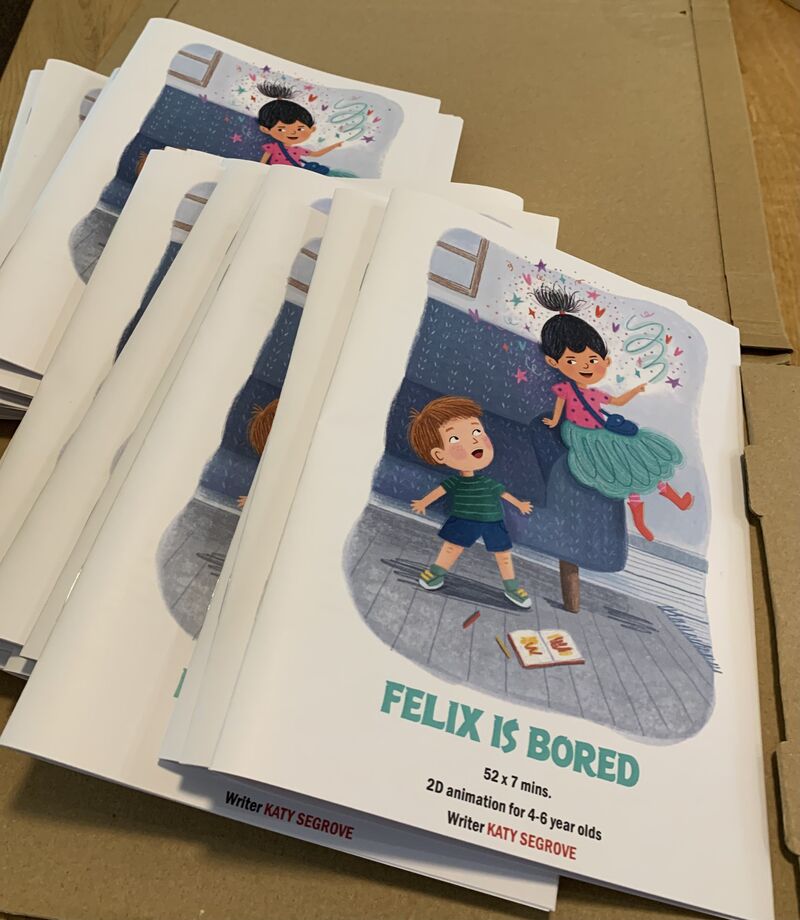After a busy few weeks preparing for and attending the Children’s Media Conference in Sheffield, I’m excited to share some insights from my experience. If you work in children’s TV, media, or storytelling in general, CMC is a fantastic event. I was fortunate enough to have 11 x 15 minute meetings with TV executives at the ‘International Exchange,’ pitching my new preschool animation series, Felix is Bored. I was thrilled with the positive response.
While I focused on pitching an animation series, the tips I picked up can be applied to any story pitch, whether you’re working on animation, live-action, or screenwriting in general.
Here are some key takeaways:
8 Tips for Pitching Your Story
1. Don’t Overdevelop Your Project
Know your idea well enough to speak about it confidently, but resist the urge to write every script or develop it too far before pitching. Use these meetings to gauge interest and gather feedback—this way, you can determine if the project is worth pursuing before fully committing. Remember, animation (and many storytelling mediums) is highly collaborative, and you want to leave space for others to bring their creative ideas to the project.
2. Practise Your Pitch in Advance
Rehearse your pitch with someone you trust—whether it’s a friend, colleague, or fellow writer—who can give you honest feedback. Have them point out what’s missing, confusing, or simply not engaging. This will help you refine your pitch and ensure you know it inside out.
3. Keep Your Pitch Short
In my experience, a 3-minute pitch is ideal. It provides just enough time to give a solid overview of your project while leaving room for questions and conversation. You want to make sure there’s space for the listener to engage.
4. Manage Nervousness
If nerves kick in, take a deep breath and smile. This will help you come across as more relaxed, confident, and approachable. Remember, the person you’re pitching to is rooting for you—they want to hear your great ideas!
5. Key Points to Include in Your Pitch
Make sure you cover the essentials:
- Title
- Age group of your target audience
- Length of episodes (if it’s a TV series)
- Logline
- Core theme
- Characters
- World-building
- Stories – Have at least one example story ready, along with the general episode structure (if it’s a series)
- Why this project is personal to you

6. Focus on One Idea at a Time
It’s tempting to pitch multiple ideas, but stick to your strongest one. Trying to pitch a slate of projects can overwhelm the listener and dilute the impact of your main idea. Have a second one in your back pocket just in case.
7. Track Your Pitches
Create a spreadsheet to keep track of everyone you pitch to and follow up with interested parties. Staying organised helps maintain momentum.
8. Bring a Pitch Deck or Mini Bible
If you’re meeting in person at a conference or festival, a pitch deck or mini bible can make a big impact. This helps your audience visualise your concept and makes your project feel more tangible. I had a lot of fun creating a mini pitch bible for Felix is Bored, and illustrator Anny Chen’s beautiful character designs truly brought it to life. Having these visual aids helped frame my conversations and made the project feel more real to the people I was pitching to.
As an introvert, pitching is way out of my comfort zone. But every time I push myself to do it, it leads to incredible opportunities.
Although these tips are drawn from my animation experience, they can be applied to pitching any type of story, from screenplays to books. Whether you’re sharing a TV series concept, a feature film idea, or a novel, the principles of clarity, conciseness, and preparation apply across the board.
How do you feel about networking and pitching?
Do you love it or hate it? All I can say is, don’t let your nerves hold you back.
If you’re looking to get your story in front of the right people—or even just want to feel more confident about your pitch—I offer 1:1 coaching to help writers sit down and write, fine-tune their work, gain clarity, and build confidence.
Let me help you finish your dream writing project.
It’s never too late.
Get in touch to learn more about how I can help you achieve your writing goals!
